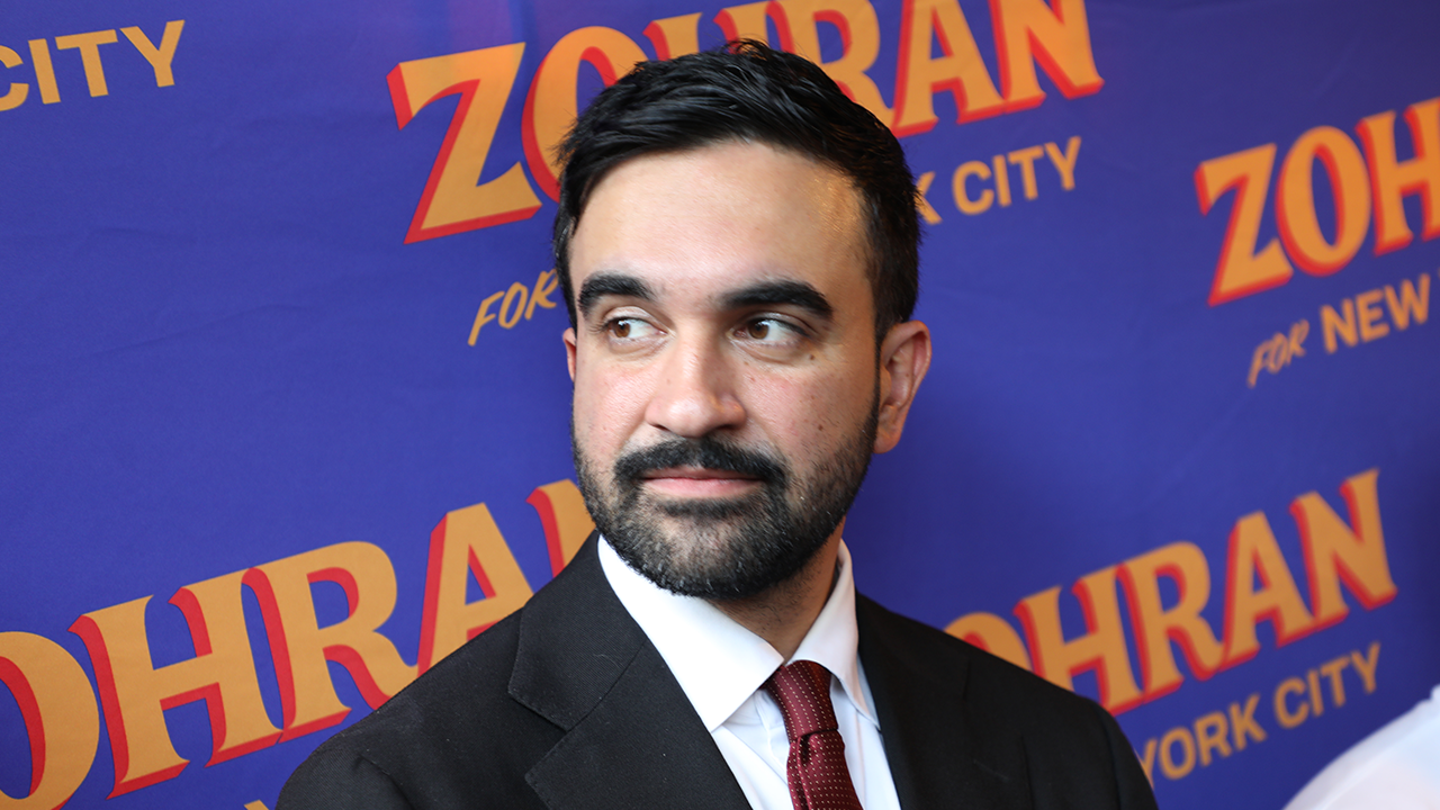
Pro-Mamdani super PAC takes hefty check from ultra-wealthy donor despite saying billionaires shouldn't exist
Entities mentioned:
- Zohran Mamdani: Ambition, Righteousness, Influence
- Elizabeth Simons: Influence, Legacy, Righteousness
- Jamie Simons: Legacy, Influence, Philanthropy
- Andrew Cuomo: Competitive spirit, Indignation, Power
- New Yorkers for Lower Costs PAC: Influence, Power, Unity
Article Assessment:
Credibility Score: 75/100
Bias Rating: 65/100 (Lean Right)
Sentiment Score: 35/100
Authoritarianism Risk: 25/100 (Generally Democratic)
Bias Analysis:
The article leans slightly right, focusing on the contradiction in Mamdani's campaign and giving voice to his critic, Andrew Cuomo. While it presents factual information, the framing emphasizes perceived hypocrisy in left-leaning politics.
Key metric: Income Inequality
As a social scientist, I analyze that this article highlights a significant contradiction between Zohran Mamdani's campaign rhetoric against billionaires and the acceptance of substantial donations from billionaire-adjacent sources. This disconnect potentially impacts income inequality by undermining efforts to address wealth concentration. The article exposes the complex relationship between political ideals and campaign finance realities, suggesting that even candidates with strong anti-billionaire stances may struggle to completely detach from wealthy donors' influence. This situation could affect public trust in political campaigns and potentially hinder genuine efforts to address income disparities in New York City.

Conservative activist slams Cracker Barrel; company left reeling after logo redesign
Entities mentioned:
- Robby Starbuck: Righteousness, Moral outrage, Influence
- Cracker Barrel: Recognition, Influence, Unity
- Steve Smotherman: Professional pride, Influence, Recognition
- Rachel CampBell: Enthusiasm, Unity, Professional pride
- Gilbert Dávila: Influence, Recognition, Professional pride
- Human Rights Campaign (HRC): Justice, Influence, Recognition
Article Assessment:
Credibility Score: 55/100
Bias Rating: 75/100 (Lean Right)
Sentiment Score: 25/100
Authoritarianism Risk: 35/100 (Generally Democratic)
Bias Analysis:
The article leans right, primarily presenting the conservative activist's perspective with limited counterbalance. It uses charged language like 'anti-woke crusader' and 'devastating video takedown', indicating a sympathetic stance towards the conservative viewpoint.
Key metric: Cultural Polarization Index
As a social scientist, I analyze that this article highlights the growing cultural divide in America, particularly around corporate branding and LGBTQ+ inclusivity. The controversy surrounding Cracker Barrel's logo change and LGBTQ+ initiatives demonstrates how traditionally conservative-leaning brands are navigating changing social expectations. This situation likely increases the Cultural Polarization Index by intensifying the perceived conflict between traditional values and progressive corporate policies. The activist's call for boycotts and the framing of the issue as a broader cultural struggle could further entrench ideological divisions among consumers and potentially impact corporate decision-making in the future.

Republican National Committee elects Trump-backed Joe Gruters as new chair
Entities mentioned:
- Joe Gruters: Ambition, Loyalty, Power
- Donald Trump: Power, Influence, Control
- Michael Whatley: Ambition, Loyalty, Professional pride
- Republican National Committee: Power, Influence, Unity
- Ron DeSantis: Ambition, Competitive spirit, Power
Article Assessment:
Credibility Score: 75/100
Bias Rating: 55/100 (Center)
Sentiment Score: 50/100
Authoritarianism Risk: 35/100 (Generally Democratic)
Bias Analysis:
The article presents a relatively balanced view of the RNC leadership change, including perspectives from different Republican figures. While it highlights Trump's influence, it also mentions potential conflicts and challenges, providing a nuanced picture of party dynamics.
Key metric: Political Party Cohesion
As a social scientist, I analyze that this article highlights significant shifts in Republican Party leadership, with implications for party unity and strategy. The election of Joe Gruters as RNC chair, backed by former President Trump, reinforces Trump's continued influence within the party. The transition from Whatley to Gruters, both Trump allies, suggests a consolidation of pro-Trump factions in key party positions. This could impact the party's direction, potentially alienating moderate Republicans or those aligned with other potential presidential candidates like Ron DeSantis. The mention of tension between Gruters and DeSantis adds another layer of complexity to intra-party dynamics, which could affect the party's cohesion and strategy in upcoming elections. The RNC's strong financial position provides a solid foundation for the new leadership, but the challenge will be in maintaining unity and effectively leveraging these resources in a potentially divisive primary season and general election.

Trump again gives Putin ‘a couple of weeks’ with no sign of Ukraine peace talks underway
Entities mentioned:
- Donald Trump: Power, Control, Influence
- Vladimir Putin: Power, Control, Self-preservation
- Volodymyr Zelensky: Self-preservation, Justice, Unity
- Sergey Lavrov: Loyalty, Duty, Control
Article Assessment:
Credibility Score: 75/100
Bias Rating: 45/100 (Center)
Sentiment Score: 35/100
Authoritarianism Risk: 55/100 (Mixed/Neutral)
Bias Analysis:
The article presents a relatively balanced view, quoting Trump directly and providing context. While it doesn't overtly criticize Trump's approach, it subtly highlights the lack of progress and uncertainty in his diplomatic efforts.
Key metric: International Relations and Diplomacy
As a social scientist, I analyze that this article highlights the complex dynamics of international diplomacy, particularly in the context of the Russia-Ukraine conflict. Trump's approach of setting deadlines and attempting to broker meetings between Putin and Zelensky demonstrates an unconventional diplomatic strategy. The repeated extension of deadlines and vague threats of consequences suggest a lack of concrete policy or leverage. This approach may impact US credibility in international relations, potentially weakening its position as a global mediator. The article also reveals the challenges of multilateral negotiations, with Russia showing reluctance to engage in the proposed talks. Trump's personal relationship with Putin, as evidenced by the photo exchange, raises questions about the influence of personal dynamics on diplomatic efforts. The overall impact on international relations metrics appears to be negative, as it showcases uncertainty in US foreign policy and a potential shift in global power dynamics.

Kilmar Abrego Garcia has been released from criminal custody, 5 months after he was unlawfully deported
Entities mentioned:
- Kilmar Abrego Garcia: Justice, Freedom, Self-preservation
- Trump administration: Power, Control, Righteousness
- CASA: Justice, Moral outrage, Unity
- Sean Hecker: Justice, Professional pride, Duty
- Federal prosecutors: Duty, Justice, Control
- Judge Waverly Crenshaw: Justice, Duty, Righteousness
- Judge Paula Xinis: Justice, Duty, Righteousness
- ICE: Control, Duty, Security
- Simon Sandoval-Moshenberg: Justice, Moral outrage, Duty
Article Assessment:
Credibility Score: 75/100
Bias Rating: 40/100 (Lean Left)
Sentiment Score: 35/100
Authoritarianism Risk: 25/100 (Generally Democratic)
Bias Analysis:
The article leans slightly left, emphasizing the perspective of Abrego Garcia and his attorneys while presenting government actions critically. However, it does include multiple viewpoints and court decisions, maintaining a degree of balance.
Key metric: Immigration Enforcement and Due Process
As a social scientist, I analyze that this case highlights significant issues in the U.S. immigration system, particularly regarding due process and the potential for wrongful deportation. The article demonstrates a complex interplay between judicial, executive, and advocacy entities, each with distinct motivations. The case of Kilmar Abrego Garcia reveals tensions between strict immigration enforcement policies and constitutional rights, potentially impacting public trust in government institutions and the fairness of the immigration system. The involvement of multiple federal judges issuing contradictory rulings underscores the complexity of immigration law and the potential for conflicting interpretations. This case may serve as a precedent for similar cases, potentially influencing future immigration enforcement practices and policies.

Judge blocks Trump from cutting funding from 34 cities and counties over ‘sanctuary’ policies
Entities mentioned:
- Judge William Orrick: Justice, Duty, Righteousness
- Trump administration: Control, Power, Determination
- Sanctuary cities/counties: Security, Unity, Moral outrage
- President Donald Trump: Ambition, Power, Legacy
- Department of Homeland Security: Control, Security, Duty
- Immigration and Customs Enforcement (ICE): Control, Duty, Security
Article Assessment:
Credibility Score: 75/100
Bias Rating: 45/100 (Center)
Sentiment Score: 40/100
Authoritarianism Risk: 35/100 (Generally Democratic)
Bias Analysis:
The article presents facts from both sides of the issue, including the administration's actions and the judge's ruling. While it gives more space to the judge's decision, it also includes the administration's perspective, maintaining a relatively balanced approach.
Key metric: Immigration Enforcement Effectiveness
As a social scientist, I analyze that this ruling significantly impacts the Trump administration's ability to enforce its immigration policies through financial pressure on sanctuary jurisdictions. The court's decision to block funding cuts to these cities and counties undermines a key strategy of the administration to compel local cooperation with federal immigration efforts. This judicial intervention represents a substantial challenge to the executive branch's authority in immigration enforcement, potentially reducing the overall effectiveness of deportation efforts and the administration's ability to fulfill campaign promises. The conflict between federal and local governments over immigration enforcement highlights deep political divisions and raises questions about the balance of power between different levels of government in the US federal system.

'Maine's Mamdani': Maine GOP chief issues warning about new challenger looking to oust Susan Collins
Entities mentioned:
- Susan Collins: Self-preservation, Loyalty, Influence
- Graham Platner: Ambition, Justice, Influence
- Jason Savage: Competitive spirit, Wariness, Control
- Maine Republican Party: Power, Control, Self-preservation
- Democratic Party: Power, Control, Unity
- Zohran Mamdani: Influence, Justice, Recognition
- Janet Mills: Ambition, Influence, Duty
Article Assessment:
Credibility Score: 65/100
Bias Rating: 75/100 (Lean Right)
Sentiment Score: 35/100
Authoritarianism Risk: 40/100 (Generally Democratic)
Bias Analysis:
The article leans right, primarily quoting Republican sources and framing progressive Democrats negatively. It presents a one-sided view of the political landscape, emphasizing potential threats from left-wing candidates without balanced perspectives.
Key metric: Political Polarization Index
As a social scientist, I analyze that this article highlights the growing ideological divide within the Democratic Party and between Democrats and Republicans. The framing of Graham Platner as 'Maine's Mamdani' suggests an attempt to associate him with more radical left-wing politics, potentially alienating moderate voters. This polarization could impact voter turnout and party unity, ultimately affecting the balance of power in the Senate. The article's focus on ideological extremes and the characterization of progressive policies as 'very unpopular' indicates a potential shift in political discourse towards more polarized positions, which could have long-term effects on bipartisanship and governance.

Zelenskyy seeks 'strong reaction' from US if Putin is not ready for bilateral meeting
Entities mentioned:
- Volodymyr Zelenskyy: Determination, Justice, Self-preservation
- Vladimir Putin: Power, Control, Influence
- Donald Trump: Ambition, Recognition, Influence
- United States: Influence, Security, Unity
- Russia: Power, Control, Influence
- Ukraine: Self-preservation, Freedom, Justice
Article Assessment:
Credibility Score: 75/100
Bias Rating: 45/100 (Center)
Sentiment Score: 40/100
Authoritarianism Risk: 35/100 (Generally Democratic)
Bias Analysis:
The article presents a relatively balanced view, quoting multiple sides and sources. It leans slightly towards a Western perspective but attempts to provide context from all parties involved.
Key metric: International Diplomatic Influence
As a social scientist, I analyze that this article highlights the complex diplomatic maneuvering in the ongoing Russia-Ukraine conflict, with the United States playing a central mediating role. Zelenskyy's call for a 'strong reaction' from the US if Putin declines a bilateral meeting suggests Ukraine's reliance on US support and pressure tactics. Trump's involvement indicates the US's continued influence in international affairs, despite potential domestic controversies. The article underscores the delicate balance of power dynamics, with each leader pursuing their own agenda while navigating the constraints of international diplomacy. The emphasis on territorial concessions and security guarantees reflects the high stakes involved in any potential peace agreement, highlighting the challenges in resolving long-standing geopolitical conflicts.

Ilhan Omar erupts at own party for reneging on socialist candidate's endorsement: 'Inexcusable'
Entities mentioned:
- Ilhan Omar: Righteousness, Indignation, Unity
- Democratic-Farmer-Labor Party (DFL): Control, Power, Self-preservation
- Omar Fateh: Ambition, Recognition, Influence
- Richard Carlbom: Control, Power, Unity
- Jacob Frey: Ambition, Self-preservation, Power
Article Assessment:
Credibility Score: 70/100
Bias Rating: 65/100 (Lean Right)
Sentiment Score: 30/100
Authoritarianism Risk: 35/100 (Generally Democratic)
Bias Analysis:
The article leans slightly right, focusing more on the internal conflicts of the Democratic Party. It gives more space to Omar's criticisms and frames the issue as a problem for Democrats, potentially appealing to conservative readers.
Key metric: Political Party Unity
As a social scientist, I analyze that this article highlights significant internal divisions within the Democratic Party, specifically in Minnesota. The revocation of Omar Fateh's endorsement by the DFL party leadership reveals a struggle between progressive and moderate factions. This conflict could potentially impact voter trust, party cohesion, and electoral success. The public disagreement between Rep. Ilhan Omar and the DFL leadership underscores the challenges faced by the Democratic Party in maintaining unity while accommodating diverse ideological perspectives. This incident may have broader implications for the party's strategy in balancing progressive and moderate voices, particularly in urban centers and among younger, more diverse voters.

Longtime Trump ally formally succeeds Whatley as Republican Party chair
Entities mentioned:
- Joe Gruters: Loyalty, Ambition, Power
- Donald Trump: Control, Power, Influence
- Michael Whatley: Ambition, Loyalty, Professional pride
- Republican National Committee (RNC): Unity, Control, Power
- Democratic National Committee (DNC): Competitive spirit, Moral outrage, Opposition
Article Assessment:
Credibility Score: 65/100
Bias Rating: 65/100 (Lean Right)
Sentiment Score: 55/100
Authoritarianism Risk: 55/100 (Mixed/Neutral)
Bias Analysis:
The article leans right, primarily due to its focus on Republican perspectives and strategies, with limited Democratic viewpoints. The source (Fox News) and the exclusive nature of the interview suggest a preference for Republican narratives.
Key metric: Political Party Strength
As a social scientist, I analyze that this article highlights the continuing consolidation of power within the Republican Party under Donald Trump's influence. The appointment of Joe Gruters, a longtime Trump ally, as RNC chair further cements Trump's control over the party apparatus. This transition is likely to impact the party's strategy, fundraising, and messaging leading into the midterm elections. The emphasis on election integrity and voter registration suggests a focus on base mobilization and potential challenges to electoral processes. The contrast between the RNC's robust fundraising and the DNC's criticism of Gruters indicates heightened partisan tensions and diverging political narratives heading into future elections.